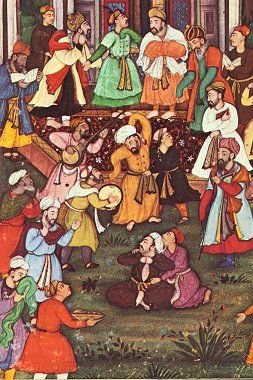Sufism in India Meaning, Definition, and Expansion-Sufism was a liberal reform movement within Islam. It originated in Persia and spread to India in the 11th century. Most of the Sufis (mystics) were men of deep devotion, who disliked the display of wealth and the decline of morality after the establishment of the Islamic Empire. These people believed in liberal Islam rather than radical Islam.
 |
| Image Credit-maulana rumi online |
- The word ‘Sufi’ is derived from ‘Suf’, which in Arabic means wool, and also means ‘purity’.
- Sufism or mysticism emerged in the 8th century,
- The earliest known Sufis were Rabia al-Adawiya, al-Junaid, and Bayazid Bastami.
- Well-developed movement by the end of the 11th century.
- Al Hujwiri is considered the oldest Sufi of the subcontinent.
- By the 12th century, there was an organization of Sufis in Silsila
Wahawat-Ul-Wujood – Sufis originated from the Wahwat-ul-Wujood doctrine of Islam. It means that God is one, behind all things in the world. There is no other power except God. Reconciliation with God takes place only when the feelings of man come in contact with God and he adopts the path of retirement. The Wahwat-ul-Wujud theory was given by Shaikh Muhi-Ud-din ibn-ul-Arni (1165-1240).
Khanqah – The place where Sufis used to do devotion while staying was called Khanqah. People from far and wide used to come to see him. He used to fill his stomach with the donations given by the people.
Chishti Silsila- Chisti Order
Founded in India by Khwaja Moinuddin Chishti,
- He came to India after the invasion of Muhammad Ghori and settled in Ajmer around 1206 CE
- His dargah reached unprecedented heights after the support of the Mughal Emperor Akbar.
- Chishti’s presence in Delhi was established by Qutbuddin Bakhtiyar Kaki (Qutub Minar is named after him)
- Another Sufi saint was Nizamuddin Auliya, who lived in the 14th century.
Suhrawardy Silsila: Suhrawardy order
- Silsila was founded by Shihabuddin Suhrawardy in Baghdad
- It was founded in India by Bahauddin Zakaria.
Naqshbandi Silsila:
- This Silsila was established in India by Khwaja Bahauddin Naqshbandi.
- Promoted by his successors, Sheikh Baki Billah and Sheikh Ahmed Sirhindi
Qadri Silsila: Qadiriya order
- Qadiriya Silsila was popular in Punjab
- Mughal rule began under the teachings of Sheikh Abdul Qadir and his sons, Sheikh Niamatullah, Mukhdum Muhammad Jilani, and Mian Mir, who enrolled the Mughal princess Jahanara and her brother Dara as disciples.
- Another prominent Pir Shah was Badakhshan.
Importance of Sufism in India
The history of Sufism in India is more than 1000 years old. Muslims who come or live in this country can be divided into two camps. There were highly religious teachers called Ulema and Fakir who are today called Sufis. Faqirs were generally tolerant of other religions and in some cases even had non-Islamic followers.
Khanqahs were the main reason for the early popularity of Sufism in India. Khanqahs were large meeting halls where followers lived with their gurus or teachers. The meeting halls also served as community centers and were open to all, providing support and sustenance, especially to the poor. He also came to be known as a center of spiritual learning which helped further increase his popularity. Since the Sufis played an important role in the intellectual development of India, their contribution in the field of religion and society is immense.
The Sufis also avoided religious and communal conflicts and even reached out to the poor and marginalized communities.
FAQ
Who started Sufism in India?
Khwaja Moinuddin Chishti, a disciple of Khwaja Osman Harooni’s exponent of this doctrine, introduced it in India. He came to India from Afghanistan in 1192 AD with the army of Shihab-Ud-din Ghori and settled permanently in Ajmer in 1195.
What is the main belief in Sufism?
Sufism is a mystical Islamic belief and practice in which Muslims seek to discover the truth of divine love and knowledge through the direct personal experience of God.
What are the types of Sufism?
Four main Sufism – Chishti, Qadiriya, Suhrawardiya, and Naqshbandi orders were mainly prevalent in India.